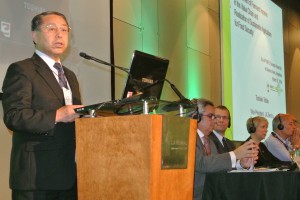Senior Staff Writer, Masaru Yamada – Buenos Aires
Representatives of farmers worldwide discussed the need for both industrialized and developing countries to cooperate to support family farmers and tackle such issues as food security and climate change at the fourth general assembly of the World Farmers’ Organization held on Thursday, March 27, in Buenos Aires.
On the second day of the meeting, Toshiaki Tobita, vice head of the Central Union of Agricultural Co-operatives (JA-Zenchu), made a speech on the JA’s role in supporting farmers and revitalizing local economies.

JA-Zenchu Vice President Toshiaki Tobita gives a speech on JA’s activities at a session in the annual meeting of the World Farmers’ Organization on Thursday, March 27, in Buenos
Tobita, who attended a session on “value chain” – how to create values in production and distribution of agricultural products – as one of the panelists, stressed that JA offers assistance for farmers in every aspect from production and processing to sales and exports, in an effort to improve their profitability and create jobs.
He said JA will work on spreading Japanese cuisine worldwide, as well as offering business management support to modernize farming, facilitating farmers’ entries into processing business through the use of investment measures, geographical indications and trademarks and promoting coordination with food product industries to create sales strategy based on local production for local consumption.
Raşit Pertev, an official of the International Fund for Agricultural Development who made a keynote speech at the session, called on the need to provide funds for farmers in developing countries, who are short of cash reserves, so that they can establish small-scale processing facilities to add value to their f Pesonen, secretary general of COPA-COGECA, an association of European agricultural organizations, criticized that supermarket chains are beating down prices of farm products and squeezing farmers’ profit margins. Pesonen stressed the need to establish business regulations and standards from the standpoint of disadvantaged farmers.
President Helena Jonsson of the Federation of Swedish Farmers also said that organizations like agricultural cooperatives should fight against supermarkets’ strong buying power and make efforts to let farmers obtain a fair share of the added value.
About WFO The World Farmers’ Organization was established in 2011 to bring together farmers’ organizations and agricultural cooperatives from all over the world. Its mission is to represent and advocate on behalf of farmers to improve the economic environment and livelihood of producers, their families, and rural communities. More than 50 organizations have joined the WFO based in Rome.
(March 29, 2014)

